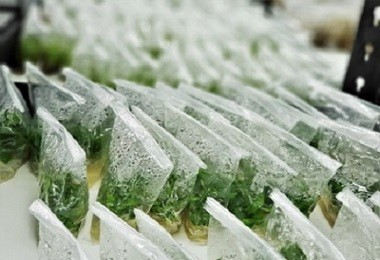Aquatic Plant Tissue Culture
 Aquatic plants in the tissue culture process
Aquatic plants in the tissue culture process
Our tissue culture system developed according to the characteristics
of aquatic plants overcomes many problems in their growth and culture
process and can provide high-quality seedlings for research and
production.
Aquatic plants are generally defined as plants that can grow normally in water or water-saturated soil on a long-term or periodic basis, including mosses, ferns, macroalgae, some seed plants, bog plants, and wet plants.
In a narrow sense, aquatic plants can be subdivided into four categories based on the distribution of leaf and root growth in water.
Aquatic plants play an important role in the structure and function of wetland ecosystems and are an important part of them. Aquatic plants can increase the transparency of water bodies, absorb nutrients such as nitrogen and phosphorus, and reduce the eutrophication level of water bodies.
Tissue culture service
The production of aquatic plants by traditional seed sowing and conventional asexual propagation methods suffers from problems such as difficulty in obtaining seeds, low seeding rates, and degradation of seeding properties. Therefore, Lifeasible uses tissue culture technology to improve the reproduction coefficient of aquatic plants, not only to obtain de(less) virulent seedlings but also to proliferate rapidly in a short time, to obtain a large number of tissue culture seedlings, as well as to breed new species, which is a new way to asexually propagate high-quality seedlings of aquatic plants and can meet the demand for aquatic plants in research and production.
Lifeasible has successfully performed tissue culture on nearly 60 aquatic plant species, using mainly stem tips, stem segments, adventitious shoots, roots, and leaves as explants.
Generally, the sterilization of explants from aqueous sources is more difficult than that of explants from other sources, and the contamination of shoots, leaves, stem segments, and roots as explants is more serious, probably since aquatic plants grow in water and are more infested with exogenous microorganisms.
Lifeasible has optimized and confirmed the appropriate tissue culture sterilization protocol for different explants of aquatic plants to address this situation, which effectively reduced the contamination rate and improved the survival rate of explants.
You want to sign a confidentiality agreement.
You have a specific plant species for your experimental needs.
You have a reliable and relevant cooperation project to discuss.
You are very interested in our project or have any questions.
You need an updated and detailed quotation.
For research or industrial use.

 Aquatic plants in the tissue culture process
Aquatic plants in the tissue culture process
